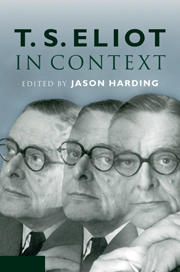Book contents
- Frontmatter
- Contents
- List of illustrations
- List of contributors
- Acknowledgements
- List of abbreviations
- Introduction
- PART ONE LIFE
- PART TWO FORMS
- PART THREE LITERARY CROSS-CURRENTS
- 16 Allusion: the case of Shakespeare
- 17 Classics
- 18 Dante
- 19 Seventeenth-century literature
- 20 Romantic and Victorian poetry
- 21 French poetry
- 22 Georgian poetry
- 23 Bloomsbury
- 24 Ezra Pound
- 25 The avant-garde
- PART FOUR POLITICS, SOCIETY AND CULTURE
- PART FIVE RECEPTION
- Further reading
- Index
18 - Dante
Published online by Cambridge University Press: 05 August 2012
- Frontmatter
- Contents
- List of illustrations
- List of contributors
- Acknowledgements
- List of abbreviations
- Introduction
- PART ONE LIFE
- PART TWO FORMS
- PART THREE LITERARY CROSS-CURRENTS
- 16 Allusion: the case of Shakespeare
- 17 Classics
- 18 Dante
- 19 Seventeenth-century literature
- 20 Romantic and Victorian poetry
- 21 French poetry
- 22 Georgian poetry
- 23 Bloomsbury
- 24 Ezra Pound
- 25 The avant-garde
- PART FOUR POLITICS, SOCIETY AND CULTURE
- PART FIVE RECEPTION
- Further reading
- Index
Summary
Speaking of Dante in 1950 to the Italian Institute in London, T. S. Eliot said: ‘I still, after forty years, regard his poetry as the most persistent and deepest influence upon my own verse’ (TCC, 125). Poets' statements about their own work are not always to be trusted, but it is true that Eliot found in Dante a continuous source of inspiration, as probably only a non-Italian poet could. Inevitably, his reading developed over the decades, with his style and outlook, and within the context of contemporary culture and society. But certain passages remained ‘touchstones’ (as Matthew Arnold called them), to which he returned again and again.
The poet Arnaut Daniel, caught in the purgatorial fire and speaking in his arcane and melodious tongue, remained an Eliot persona, perhaps the Eliot persona. In Purgatorioxxvi another poet, Guido Guinizelli, tells Dante that ‘questi ch'io ti cerno col dito … fu miglior fabbro del parlar materno’ [‘he whom I point out … was a better craftsman of the mother tongue’] and Eliot appropriated the sobriquet ‘miglior fabbro’ in the generous dedication of The Waste Land to Ezra Pound. He used the final line of this canto, narrated by Dante, ‘then he hid in the fire that refines them’, among the fragments ‘shored’ at the end of his masterpiece, in the original Italian.
- Type
- Chapter
- Information
- T. S. Eliot in Context , pp. 180 - 189Publisher: Cambridge University PressPrint publication year: 2011
- 2
- Cited by

